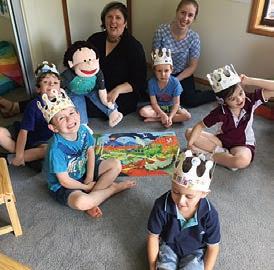
5 minute read
Your child and their ability to focus at school?
Your child
BY CLARE MARCANGELO
and their ability to focus at school?
Believe it or not, this is a common concern for parents, and it can lead to a lot of sleepless nights. It’s not unusual for parents of soonto-be kindergarteners, trying to imagine, deduce, and ultimately read the future based on their children’s past behaviour and a whole lot of unknown factors.
But it is also a big worry for parents of children returning to school, hoping that this year will be better than last year, that they may have less calls and meetings with the teachers, that they have done enough to be ready for this year.
On the surface, this kind of concern sounds very “normal” it’s just something that could happen to your child, not everyone can find school easy right? Just another parenting thing to tick off like needing braces or the odd bout of gastro.
It can be, sure, but for some parents having a child struggle to concentrate in class can quickly lead to a lot of sleepless nights, endless worry and a feeling of desperation. And the effect on the child really depends on the root of the issue. It can be a simple one, completely reversed by the right teacher who either “gets” your child in a way that previous teachers didn’t, or one that has the right tools to help. These teachers are worth their weight in gold, and believe me, they have the power to completely
transform the trajectory of your little one’s school career.
All professionals in the world of child development, no matter what their expertise agree that early intervention is the key to success for a child.
BOOK YOUR FREE TRIAL NOW!
Awaken your child to the thrill of sport


ON THE COAST – FAMILIES readysteadygokids.com.au 1300 766 892 Franchise opportunities available We are Australia’s largest multi-sport program for 1.5–6 year olds! • Learn the basics of 10 great sports • Low child/coach ratios • Physio-designed, structured & FUN!

This applies no matter the issue or root cause. So that being said, as a parent its important to investigate what those things may be as soon as you start to feel your child’s issue is getting bigger than what you can manage alone.
But what about making in-roads with your child? To do this, it is important to try and discern what may be causing the issue. Firstly, speaking to your child’s previous teacher and getting a good picture of what they are seeing in class is important, even if you believe that their opinion is inaccurate. Speaking to your child in a nonpressured manner to encourage answers is great too. Often they may give great insight that yourself and the teachers could never have seen alone, sometimes children are actually able to give a very specific name to what is happening, and success can go from there.
Understanding as much as possible about what happens in class is imperative as we need to know the drivers for these issues.
For example, some children may be experiencing a hidden learning issue hindering their progress just enough to go unnoticed, but make it look as if they’re simply not trying, or paying attention in class.
A child may be experiencing extreme anxiety, which is causing them to feel completely overwhelmed and shut down during learning, or employ coping mechanisms to deal with this. These coping strategies can look like anything from just not keeping up with workload, not engaging in floor time activities, or even disruptive behaviours. This is because of our body’s “fight or flight” mechanism, designed to keep us safe from danger. Unfortunately, in times of extreme anxiety, that feeling of being unsafe is physiologically the same as if there were a physical danger, so adrenaline and other chemicals flood the body in response, which can leave us with a racing heart, dizzy, short of breath, and foggy in the head, definitely not the recipe for concentrating in class. In other cases, stimuli from the classroom that other students may take in their stride such as noise, light, constant change of activity and routine, and general demands can overwhelm a little body’s system. These children need to find ways to regulate their emotions, which can lead to outbursts, hyperactivelike behaviours or just difficulty focusing. Another very common cause is of course food. A child may be simply experiencing an inconsistent up and down of their blood sugar levels, causing irritability, brain fog and fatigue, or conversely, big bursts of energy at the wrong time. They may be reacting to certain foods, sugars or additives in even
the healthiest of diets, which can lead to anxiety, impulsive behaviour or difficulty engaging in learning.
I’ve named but a few possible explanations for your child’s difficulties keeping focused in the classroom, but there are so many more, so its important to keep going until you get to the bottom of them. Whatever the issue is however, it’s so important to seek support and help from those in the know such as your GP, child psychologists, tutors trained in learning difficulties, Occupational Therapists, Nutritionists, and Speech Therapists as no-one experts you to be an expert, and you don’t need to do it alone. You are, however the number one expert and best support person for your child and with your help they will get to wherever they need to go.
Clare Marcangelo is a local registered Nutritionist and former Early Childhood practitioner who specialises in children’s health. As a mum herself, she knows how hard it can be to make even the smallest of changes to a family diet.




















